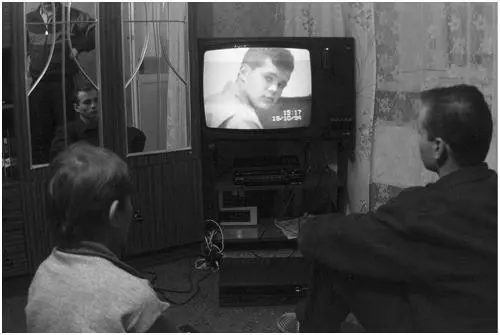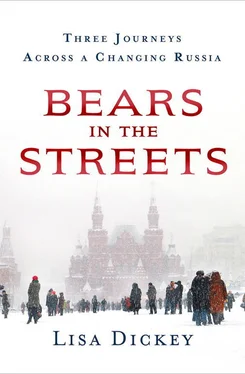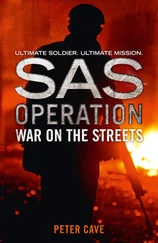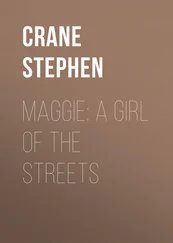
Video image of 19-year-old Zhenya at the Institute party, two months before his death (PHOTO BY GARY MATOSO)
Zhenya was sent to Volgograd, which, considering Russia’s vastness, was a relatively close posting—just 30 hours away by train. “We were so happy to have him close by,” his mother told me. “We couldn’t believe how lucky we were that he hadn’t been sent off to Arkhangelsk or some other faraway northern place.”
After serving almost a year in Volgograd, Zhenya came home on leave in October 1994. He was a proud, clean-cut soldier now, eager to see his family and fiancée. He didn’t tell Natasha K. he was coming, but instead showed up in his army uniform at the Institute, where she still was a student. Like in a scene from a film, he came and swept her off her feet, to the delight of students and teachers.
Two nights after his return, Zhenya and his buddies gathered at the Institute for a party. His mother showed us a video taken that evening, showing a slightly drunk, very happy Zhenya cutting up with friends and playing the piano. About halfway through the video, he turns from the piano to look directly at the camera, which zooms in on his young, handsome face; as we watched, it was difficult to believe that the man in the flickering image no longer existed anywhere but in memory.
On November 7—a month before the war began—Zhenya’s family and friends took him to the Kazan railway station for the train back to Volgograd. “Zhenya promised to try to get back for New Year’s,” his mother told me. “He thought he’d be able to get leave somehow. And even if he couldn’t, his army discharge was scheduled for May, which didn’t seem that far off.” She sent him off with a hug and a smile, a fact that now haunted her.
“I never dreamed when we went to the station that day that that would be the last time I ever saw my son,” she said as tears streamed down her face. “We saw him off that day just as though we’d be seeing him in a few weeks.”
Zhenya was sent to Chechnya the first week of December, though in a letter home, he lied so his mother wouldn’t worry. “Hello from Volgograd!” he wrote:
Everything here is fine so far, I’m alive and well, and miss you. They’ve begun to give us a little bit of compensation, and now on December 12, the “100 days” starts—100 days until discharge…
After being home on leave, I am really sick of the army. The monotony really gets on my nerves… We’re now doing technical and weapon preparation for training in shooting, and after the New Year we may go on a training mission, I’m not sure for how long…
On December 11, three days after Zhenya posted this letter, Russian troops launched their assault on Grozny. For two days, the Russian government pretended nothing was happening, but on December 13, President Yeltsin officially acknowledged the fighting. Natalya still didn’t know her son was in Chechnya, but she feared that was where he’d end up. “Calm, peaceful life ended for us on December 13,” she told me. “We watched the television news every night, trying to get some information about what was going on there. I just had a bad feeling after the fighting began.”
Two weeks later, the mother of another soldier called Natalya with the frightening news that her son, who’d been serving with Zhenya in Volgograd, had been wounded while fighting in Chechnya. He was recuperating in an army hospital outside Moscow, and she was traveling there to see him. “She promised to call and let me know if she found Zhenya in the hospital too,” Natalya told me.
But Zhenya wasn’t in Moscow; he was still in the mountains outside Grozny. In late December, he wrote a letter to Natasha K. revealing his location and describing the horrors of combat:
I have been in the mountains 12 kilometers from Grozny, the capital of Chechnya, for three weeks already… I’m not going to write to my parents, as I can only imagine what would happen if they knew.
I’ve been through four battles, and the scene is terrible. We’ve had 16 wounded and 4 killed. One officer had his leg blown off… We wear our bulletproof jackets and keep our machine guns close even when we sleep, because at any moment there could be “jazz”—an attack…
This letter is going with the first delivery out of here, and I don’t know if it will get to you or not, since we’ve been surrounded for two days. The worst of all is when they start to shoot, they even shoot innocent people… The Chechens have hired Turkish fighters, who are professionals at this. We shot at them the night before last, there’s about 40 of them hidden behind a ravine… They usually attack at night, which is convenient for them as they know the mountains well.
Two days later, on December 31, 1994, chaos erupted in the mountains. Soldiers were given vodka to celebrate Defense Minister Pavel Grachev’s birthday, and a savage battle soon broke out between the Russian and Chechen forces. The details are murky, but sometime that night, Zhenya met a brutal death: the headless body of the young soldier had to be identified by the tattoos on his hands and an existing scar on his chest.
From the moment she’d heard from the other soldier’s mother, Natalya had been calling army services several times a day to ask if Zhenya was on the lists of those wounded, captured, or killed in Chechnya. Every day for more than two weeks, she was told he was not. Then, on the afternoon of January 13, she got a call at work.
“Come to the Military Commissar’s office,” said a voice. “We have news for you.” It was what they’d been dreading. “Your son’s body will arrive by train at four thirty tomorrow morning,” an official informed them. “Go home and prepare to receive his coffin.” In shock, the couple did as they were told, going home and covering the mirrors according to Russian Orthodox tradition. Realizing she didn’t have a formal photo of Zhenya in his army uniform, Natalya arranged for a photography shop to superimpose a photo of her son’s face onto the body of another soldier. This was the photo now displayed in their living room.
The following morning, the coffin bearing Zhenya’s body arrived at the train station. “I waited at home for my husband and his friends to bring it back here,” said Natalya. “The whole time, I kept thinking, ‘Maybe there’s been a mistake. Maybe they’ll get there and find out he’s still alive.’ But of course, it wasn’t a mistake.”
Every other day in summer, and once a week when it became cold, Natalya went to the cemetery. On our last afternoon in Kazan, Gary and I went with her. We rode the bus for three stops, then made the long walk across a grassy slope toward the cemetery, where Zhenya’s grave was marked off by a wrought-iron fence decorated with lyres. The granite tombstone bore an engraved image of Zhenya’s face, his guitar, and two roses. We watched as Natalya straightened the flowers she’d left earlier in the week, muttering to herself, “How could I have known, when we went to the train station a year ago…?”
Although Natalya had at first welcomed us only reluctantly, by the end of our visit, she seemed proud we were doing a story about her son. She wanted people to know what a good person he’d been, and how utterly senseless the war in Chechnya was. “For this stupidity my son died,” she said, practically spitting out the words. “It’s all the worse that his death was for nothing at all. For nothing.”
* * *
Ten years later, David and I arrived in Kazan on a blindingly sunny Saturday afternoon. Before setting out to find Natalya, we decided to take a stroll around the city.
Читать дальше













